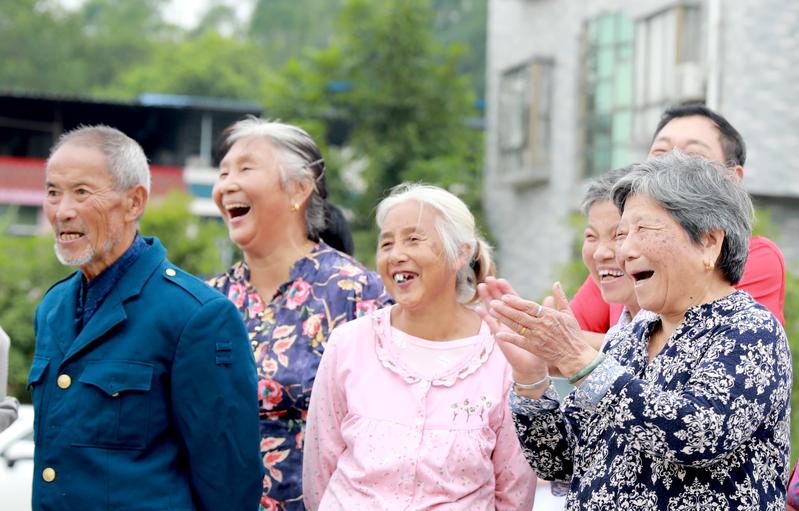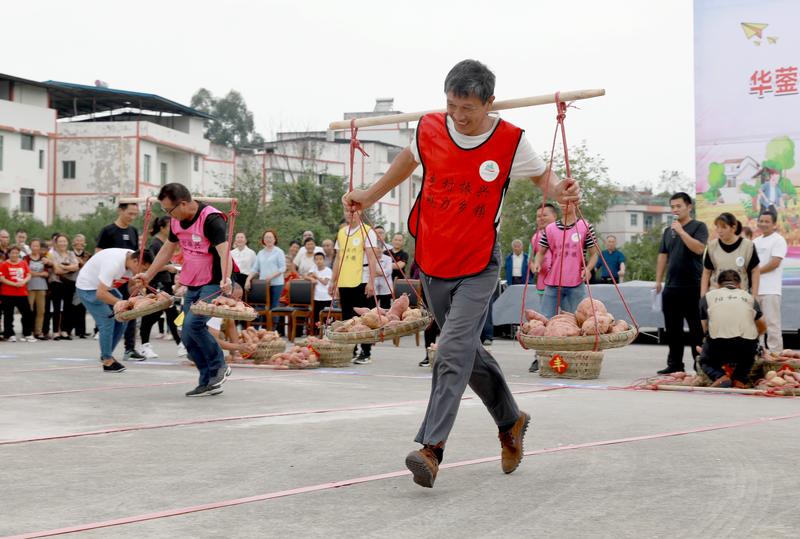Isolated amid the mountains, village's cultural renewal brings a real sense of community, Yang Feiyue reports.
 Farmers enjoy watching a recreational agricultural game, part of a series of events to celebrate harvest, in Huaying, Sichuan province, in September last year. (ZHOU SONGLIN / FOR CHINA DAILY)
Farmers enjoy watching a recreational agricultural game, part of a series of events to celebrate harvest, in Huaying, Sichuan province, in September last year. (ZHOU SONGLIN / FOR CHINA DAILY)
As befits a village steeped in history and located deep in the mountains, the harvest is being celebrated the old-fashioned way.
Tan Xinquan was watching a folk music performance along with dozens of others at a public square early this month in Tangbaqiu village, Linshui county, Guang'an city in Southwest China's Sichuan province.
Villagers even danced to the music with big bamboo baskets in their hands, and everyone was laughing and applauding and generally having a great time.
It was quite a nice change of pace for Tan, who has been rising with the lark since September.
"It's the harvest season," says the 60-year-old born and raised in Tangbaqiu.
Tan has been busy reaping what he sowed in the farmland earlier this year.
He has ridden his motorcycle at 6 am to the field where he worked for four hours.
Tangbaqiu is tucked in the mountains, and water supply there is good, so crops have consistently grown well over the years.
"I take a noon break and then get back to the field late in the afternoon for another two to four hours," Tan says.
He has reaped about 900 kilograms of paddy rice out of 667 square meters of land this year.
 Participants compete in a sweet potato carrying race as part of the aforementioned harvest celebrations. (ZHOU SONGLIN / FOR CHINA DAILY)
Participants compete in a sweet potato carrying race as part of the aforementioned harvest celebrations. (ZHOU SONGLIN / FOR CHINA DAILY)
He also keeps another 1,333 square meters of field of corns, beans, pumpkins and a few other vegetables.
"It is tiring, all the work, but the good harvest is cheering, making every pain worth it."
He is pretty much done with the harvest by middle September and is working on sun drying the unhusked rice before putting them in storage.
Tan says the folk music performance helped him to recover his strength and zest.
It was part of the celebrations for harvest in the village since 2018.
"We play chess and make gluttonous rice cake together in the harvest season," Tan says.
The festival is to enrich local villagers' life and increase cohesion, says Lin Houbin, a senior official in Tangbaqiu.
"We want the villagers to feel like the world is celebrating their harvest," Lin says.
The celebration also helps to highlight the virtue of traditions in the village.
Villagers are encouraged to help one another in finishing the last stage of their farming work.
"It, in some way, fosters good rural neighborhood relations," Lin says.
 Corn is piled on the ground ready to be processed in Tangbaqiu village, Linshui county, Guang'an city, Sichuan province. (YANG FEIYUE / CHINA DAILY)
Corn is piled on the ground ready to be processed in Tangbaqiu village, Linshui county, Guang'an city, Sichuan province. (YANG FEIYUE / CHINA DAILY)
The village has staged many similar celebrations for farming events, such as the rice-seedlings transplant during Dragon Boat Festival, which is the fifth day of the fifth lunar month and fell on June 14 this year.
"It's nice to see the smile on our villagers' face when they are reaping in the field or carrying the harvest on a pole across their shoulders during the celebrations," Lin says.
Since 2018, China has designated the autumnal equinox of the lunar calendar, which will fall on Sept 23 this year, for farmers to celebrate the annual harvest.
The festival was approved by the Communist Party of China Central Committee and the State Council to vitalize rural culture.
It aims to give greater importance to rural work, speed up the implementation of China's rural vitalization strategy, and push for faster development of agriculture and rural areas, according to the Ministry of Agriculture and Rural Affairs.
Autumnal equinox is one of the 24 solar terms of the Chinese lunisolar calendar and marks the country's agricultural harvest season.
Celebrations have been organized to display the agricultural harvest, rural technology achievements and farmers' creativeness. Farmers are encouraged to engage in activities related to their work and life during the harvest festival.
Rural vitalization is a key part of China's efforts to develop a modernized economy. The goal is to nurture a strong agricultural sector, a beautiful countryside and well-off farmers through vitalizing its vast rural regions.
 A closeup of the rice crop. (YANG FEIYUE / CHINA DAILY)
A closeup of the rice crop. (YANG FEIYUE / CHINA DAILY)
Tangbaqiu was home to migrants from Hunan and Hubei provinces during the late Ming (1368-1644) and early Qing (1644-1911) dynasties. It preserved a cluster of 20 ancient folk buildings that date back to the historical period. Although many buildings have braved the elements after standing the test of time for hundreds of years, the green tiles arranged neatly on the roof and the delicate dragon and phoenix patterns carved on the windows are nothing short of extraordinary, allowing one to feel their unique cultural and artistic charm.
The village was named one of the most beautiful ancient villages in Sichuan by the provincial government in 2018.
Local authorities have focused on improving villagers' livelihood and cultural life over the years, which paved the way for the harvest festival.
The village has given locals subsidies of up to 40 percent of the price of farming machinery they purchase.
Roads linking rural households to their farmlands have been developed to make things easier for their farming.
"Villagers can better use modern transportation to ease farming work while raising efficiency," Lin says.
At the same time, efforts have been made to develop cultural activities. Villagers can be found practicing calligraphy and appreciating poems and paintings at the village activity center.
Library and facilities for chess, table tennis and badminton are available.
"Everyone stayed at home watching TV in the past, but now people come to the culture square," says Zhang Shuliu, a local villager.
Villagers come to enjoy the recreational activities after they finish farming work, she says.
Liu Danjian, 55, was one of the folk music players at the harvest ceremony.
 A resident in the village carries a wooden plow to evenly spread grains of rice for drying. (YANG FEIYUE / CHINA DAILY)
A resident in the village carries a wooden plow to evenly spread grains of rice for drying. (YANG FEIYUE / CHINA DAILY)
He has been into various folk music instruments, such as suona (traditional double-reed horn) and wooden drum since he was a child.
"I have had more occasions than before to perform in public," Liu says.
He has been invited to play at birthdays, funerals and business openings.
His talent has helped him increase his earnings and given him a sense of satisfaction.
As the village infrastructure is upgraded, travelers from outside have made their way to explore its ancient charm.
It has brought new business opportunities for local farmers. Some have opened rural catering businesses.
Tan is quite satisfied with his life now, he says. He is living with his father, wife and two grandsons. The farming work has shifted from pure manual to mechanic.
He used to walk through muddy fields to the farming land and had to carry water on his shoulder.
Now, the well-paved road allows him to drive his truck directly to the field and upload all the harvest onto the truck coming back home.
In addition, Tan says he has got a pension and a subsidy for farming work from the government.
The good harvest this year means ample food for his family, as well as his three sons and three daughters working away from the village.
"I'll send them our own farm produce, which would be hard to find in their places," Tan says.
Contact the writer at yangfeiyue@chinadaily.com.cn


